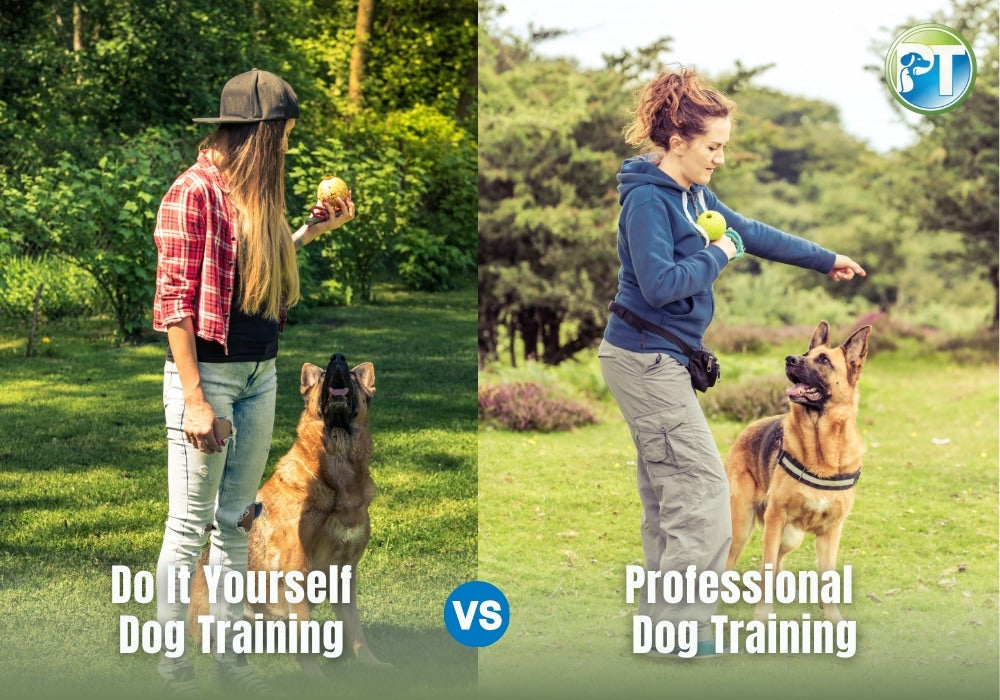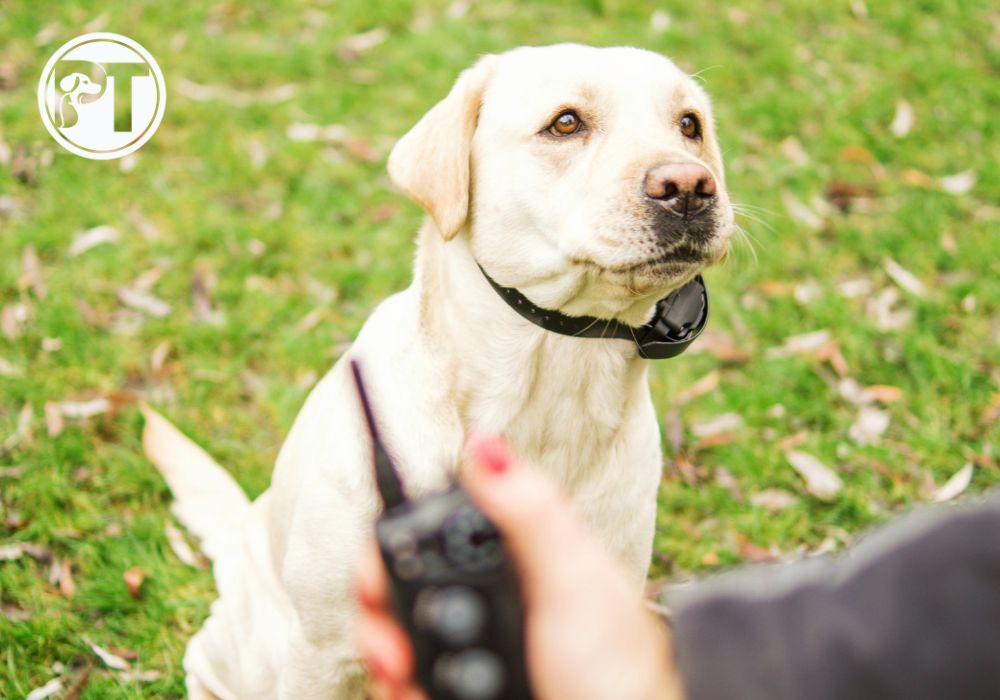Training Your Dog: DIY vs. Professional Help – Which Is Right for You?

Training your dog is an important part of being a pet owner. Early on, you'll likely ask yourself:
Should I train my dog on my own, or should I seek help from a professional?
There are good reasons to do either, and the best choice depends on several factors. In this blog post, we'll explore the pros and cons of each option to help you decide what's right for you.
The DIY Approach to Dog Training
DIY dog training can be incredibly rewarding. It's a great way to connect with your furry friend while teaching them good behavior. However, going the DIY route requires patience, consistency, and knowledge about dog behavior.
Doing It Yourself: The Good Stuff

-
Saves Money
Let's face it, hiring a professional dog trainer can be a significant investment. For many pet owners, budget is a major factor. With DIY training, your primary investment is time and dedication. You might need to buy some treats, a leash, a clicker, or a training collar, but that’s far less costly than professional fees.
-
You're in Charge
When you train your dog yourself, you have complete control. You choose the training methods, set the pace, and focus on the specific behaviors you want to address. Want to teach your dog to fetch the newspaper? You can work on that! Need to brush up on leash manners? You can dedicate extra time to that too.
-
A Deeper Bond
Training is a fantastic way to strengthen your bond with your dog. Through consistent training sessions, positive reinforcement (like treats and praise), and shared moments of learning, your dog learns to trust and respect you.
-
Fits Your Schedule
Life is busy. DIY dog training allows you to fit training sessions into your own schedule. Whether you prefer short 10-minute bursts daily or longer weekend sessions, DIY dog training offers flexible scheduling to fit you.
Doing It Yourself: The Challenges

-
Lack of Expertise
Unless you’re already a seasoned dog trainer or have studied canine behavior, DIY training can be tricky. It’s easy to misinterpret your dog’s signals or accidentally reinforce unwanted behaviors.
For example, if your dog jumps on you for attention and you give them a pat, you’re inadvertently rewarding the jumping.
-
Inconsistent Results
Consistency is the golden rule of dog training. Without a professional’s guidance, it’s easy to slip up or become inconsistent. This can confuse your dog and slow down the learning process.
-
It Takes Time and Patience
Training a dog takes time and dedication, especially when you’re doing it alone. You’ll need to be patient and understanding, and you might not see results overnight. This can be frustrating for both you and your dog.
-
Tough with Serious Behavior Problems
If your dog has serious behavioral issues like aggression, severe anxiety, or fear of loud noises or strangers, DIY training might not be enough. These issues often require the expertise of a certified professional dog trainer or veterinary behaviorist.
Hiring a Professional Dog Trainer
Thinking about hiring a professional dog trainer? If you want quicker results or your dog has some tricky behavior problems, it might be the perfect solution. Before making a decision, let’s explore the pros and cons.
Hiring a Pro: What's Good About It

-
Expert Knowledge and Experience
Professional trainers have spent years understanding dog behavior and mastering training techniques. They can quickly identify the root cause of behavior problems and develop effective solutions. They’ll also teach you valuable handling skills.
-
Faster Results
With their experience, professional trainers can often achieve results more quickly than someone training their dog on their own. They know how to break down training into manageable steps and use effective methods.
-
Personalized Training Plans
A good trainer will assess your dog’s individual needs, temperament, and any specific behavioral challenges. They’ll then create a customized training plan tailored to your dog. This personalized approach is often more effective than generic training methods.
-
Support and Guidance
Training can be challenging, and having someone to turn to for advice and encouragement is invaluable. A professional trainer provides ongoing support, answers your questions, and helps you stay on track.
-
Socialization Opportunities
Many professional trainers offer group classes, providing valuable socialization opportunities for your dog. Interacting with other dogs in a controlled environment can improve their social skills and reduce behavioral issues.
Hiring a Pro: The Downsides

-
Cost
The biggest drawback is the cost. Private training sessions, group classes, and board-and-train programs can be expensive.
-
Finding the Right Trainer
Finding a qualified and reputable trainer is crucial. Look for certifications (like CPDT-KA or KPA-CTP) and ask for recommendations from your veterinarian or local animal shelters. If you’re unsure where to start, we have trusted dog trainer partners to help match your needs. Observe a class or talk to previous clients to ensure the trainer aligns with your goals and your dog’s needs.
-
You're Still Involved
Even with a professional, you’ll need to be actively involved in the training process. Practicing with your dog at home reinforces what they’ve learned during training sessions.
-
Scheduling
Finding a trainer who fits your schedule can sometimes be difficult, especially if they’re in high demand.
DIY Dog Training or Professional Dog Training: Which is Right for You?
So, DIY or a professional trainer? It really depends on you and your dog. Here are a few things to consider:
1. Your Time and Schedule: Do you have the time and patience to commit to DIY training? If you’re working long hours or have a packed schedule, hiring a professional can help you see results without burning yourself out.
2. Your Dog’s Behavior: If your dog has serious behavioral issues like aggression, separation anxiety, or fear, a professional trainer is often the best option. For basic training, such as housebreaking or teaching commands, DIY training can be just as effective.
3. Your Budget: If cost is a major concern, DIY training may be the more feasible option. Resources like online courses, books, and videos can help you get started. However, if you’re facing complex behavioral issues, hiring a pro might be a worthwhile investment.
4. Your Confidence and Knowledge: How confident are you about training your dog? If you’re a first-time dog owner or have never trained a dog before, feeling a little unsure is normal. A professional trainer’s expertise can make a significant difference.

Final Thoughts
Choosing between DIY dog training and hiring a professional is a personal decision. There's no right or wrong answer. Both can work well if you're willing to put in the time and effort.
Remember, every dog is different. What works for one dog might not work for another. Be patient with yourself and your dog, and choose what feels right for both of you. Happy training!
You might also enjoy...
-
Posted in
Pet Training, Training Tips


